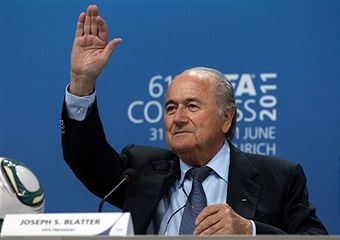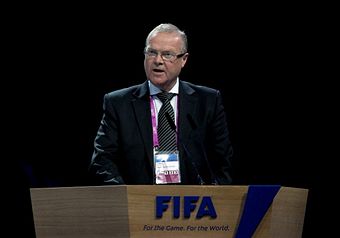The past, in football, is not a foreign country. It is ever present and always points the way to what is going to happen. The FIFA Congress in Zurich was a wonderful illustration of that.
What it showed was that Sepp Blatter uses the football past as if he owns it, and the English Football Association never seem to learn from history.
Sepp Blatter proved the ultimate politician, as he has done so often in the past, and the English FA, showed, once again, that the country that gave us the game still cannot work out how the modern game, particularly the modern football political game, works. The defeat inflicted on England was, in some ways, an even more shattering defeat than the one England suffered in the same hall back in December when it only got two votes for its 2018 World Cup bid.
In the end, this produced one of the great ironies of recent times. The world had come to Zurich to bury Blatter. But it left the Swiss headquarters with Blatter triumphant and the English FA buried. Indeed, the defeat suffered by England was so grievous that many were expressing real fears that the privileges the British Home Nations have – four seats in FIFA, a FIFA vice-president elected by just the British and a half share on the International Board – may now be under threat.
To appreciate how the past was a guide to this Congress, examine how Blatter orchestrated it. Let me take you back to the summer of 2001. We are in Buenos Aires for a FIFA Congress. ISL, FIFA’s marketing company, has collapsed with disastrous effect on FIFA’s finances. Blatter is under severe attack as a result of this and ranged against him are members of his own Executive from UEFA. It is certain that he will face a very rough ride when the Congress meets. UEFA are on the attack and have prepared their strategy carefully.
So what did Blatter do?
He took over the Congress even before it had started its formal session, made a rumbustous speech saying all was well with FIFA and even got a vote of acclamation. Meaningless as the vote was, Blatter knew what the effect of this pantomime would be. It meant he had won even before UEFA could get started. It was a masterly display of politics.
 Well, something very similar happened in Zurich. Blatter did not play the showman in the way he did in Buenos Aires, or in many other places. Here, he was much more subdued. This was hardly surprising given that, as the Congress began, not only was the outside world baying for blood, but there were voices for reform within the hall.
Well, something very similar happened in Zurich. Blatter did not play the showman in the way he did in Buenos Aires, or in many other places. Here, he was much more subdued. This was hardly surprising given that, as the Congress began, not only was the outside world baying for blood, but there were voices for reform within the hall.
The effect of this was very noticeable on Blatter. Blatter may have said at his press conference on Monday, “Crisis? Where is the crisis?”
But then he heard the Swiss President, Micheline Calmy-Rey, addressing the opening session on Tuesday, urging Blatter to “take seriously the many criticisms voiced about corruption” and calling for reform of its governance. Blatter had also taken note of what was said by the International Olympic Committee President, Jacques Rogge. Rogge had reminded the Congress, “Thirteen years ago we had to face the same ordeal regarding the Salt Lake City Games. The IOC, however, ultimately emerged a stronger organisation and from within.”
Blatter knew his showman tactics of Buenos Aires were not appropriate in Zurich. However, what followed was just as politically shrewd and very likely orchestrated, but carried out very differently. After David Bernstein, the chairman of the FA, had made his plea for elections to be postponed, there followed a political theatre of the most intricate kind.
The first man to oppose England was from Haiti. Its President, Yves Jean-Bart, pulled at our heartstrings by telling us how football had helped his devastated country. He then praised Blatter for rescuing FIFA in the past, before putting the knife into England. Congo’s Selemani Omari, who followed, made it clear how England had sinned. It had brought in outsiders and their heretical views into FIFA’s house and profaned its sacred family. It was clear Mbono did not like the idea of the revelations made by Lord Triesman to the Commons Select Committee. The idea of an English Lord talking about World Cup bribes to a Parliament outside the House of FIFA clearly rankled.
The attacks on England were intensified in hurt tones by Benin’s Anjorin Moucharafou, who expressed surprise that his countrymen so liked English football, yet England could make such a proposal. If the logic of this was curious, it was clear he was in tune with the audience. It was at this stage that one could see how Blatter was having an impact on the Congress. Bernstein’s proposal had been received with at best muted applause. Now, as Moucharafou spoke in favour of Blatter, the hall broke into thunderous applause.
The first three speakers were all black and from developing countries. Just to make sure that the anti-English rhetoric was world-wide and even extended to Europe, the next speaker was Costakis Koutsokoumnis from Cyprus. It was interesting that he was the first one to openly challenge the allegations and criticise the media. All this was neatly rounded off by Sahu Khan, President of Fiji’s Football Association. He is of Indian origin and a lawyer by profession. He pontificated that, far from not holding the elections being the right course, not holding them would actually violate the statutes of FIFA. In fact, he went on to say that if elections were not held now, they could not be held until 2015, as under the rules only an ordinary Congress, meeting in the year after a World Cup, can do so. And the next World Cup was not till 2014.
So could FIFA go leaderless for this length of time? And why? Because there was only one candidate. Khan, himself, has been President of Fiji Football Association since 1985 and has often been re-elected unopposed. As he articulated that, the hall burst into thunderous applause.
Observe back in 2001 the Blatter supporters were Haiti, Jamaica, Peru and Cuba. And the motion endorsing everything Blatter was doing, and congratulating him, was proposed by a certain Ivan Slavkov, then President of the Bulgarian Football Association. Four years later he was expelled from the IOC following a BBC Panorama investigation.
It is interesting that while England drew comfort by attracting 16 other countries (one of them Vietnam by mistake), none of them spoke. Not even Scotland, which had announced it would support England. Yes, England was bold, but boldness without wisdom is reckless folly. This was the FA’s charge of the Light Brigade moment.
They did not judge the mood of their fellow members, let alone understand them. England now find themselves in an unenviable position. The French may have created FIFA, but without England creating football and codifying the rules, the whole thing could never have got started. Yet now, England are now so far out of the club, that not only does no-one speak in their support, but the men who run FIFA delight in abusing them openly, as Julio Grondona did.
In recent years, the English FA have been rather good at not getting things right in FIFA. Every time they strike out on their own they get it wrong. In 1998, they deserted Lennart Johansson for Blatter, hoping this would help them get the 2006 World Cup. They failed. In 2002, Adam Crozier spoke out very strongly against Blatter at the Seoul Congress and Blatter went on to win re-election. Now this.
 The need for FIFA reform is overwhelming. The FA’s experience with the 2018 bid also intensified the pressure on the organisation. But the FA could learn from how the Scandinavian countries handled it. Led by Danish Football Association President, Allan Hansen (pictured), they spoke out publicly for an independent inquiry, which is also one of England’s demands. However, they did it in a way which carried support and even Blatter’s approval.
The need for FIFA reform is overwhelming. The FA’s experience with the 2018 bid also intensified the pressure on the organisation. But the FA could learn from how the Scandinavian countries handled it. Led by Danish Football Association President, Allan Hansen (pictured), they spoke out publicly for an independent inquiry, which is also one of England’s demands. However, they did it in a way which carried support and even Blatter’s approval.
The fact is, whether England, and the world at large, likes it or not, Blatter is the great immovable object in football. There will be many who will doubt if his can fulfil his promises to right the ship of FIFA given how holed it appears. Such is the distrust for FIFA, some may also doubt if he really means what he says.
But then, back in 1998, it did not look as if the IOC would get its act right. It did. Now it is a model for FIFA to follow. Blatter has much to do to match his words with action. But the FA has as much, if not more to do to make sure it learns how to be a useful passenger in this FIFA ship. Constant threats to capsize it make for good theatre, but it is not an effective way of operating. More so for the country without whose inventive genius for games, this ship of football would never have been launched.
Mihir Bose is one of the world’s most astute observers on politics in sport and, particularly, football. He formerly wrote for The Sunday Times and The Daily Telegraph and until recently was the BBC’s head sports editor

.jpg)